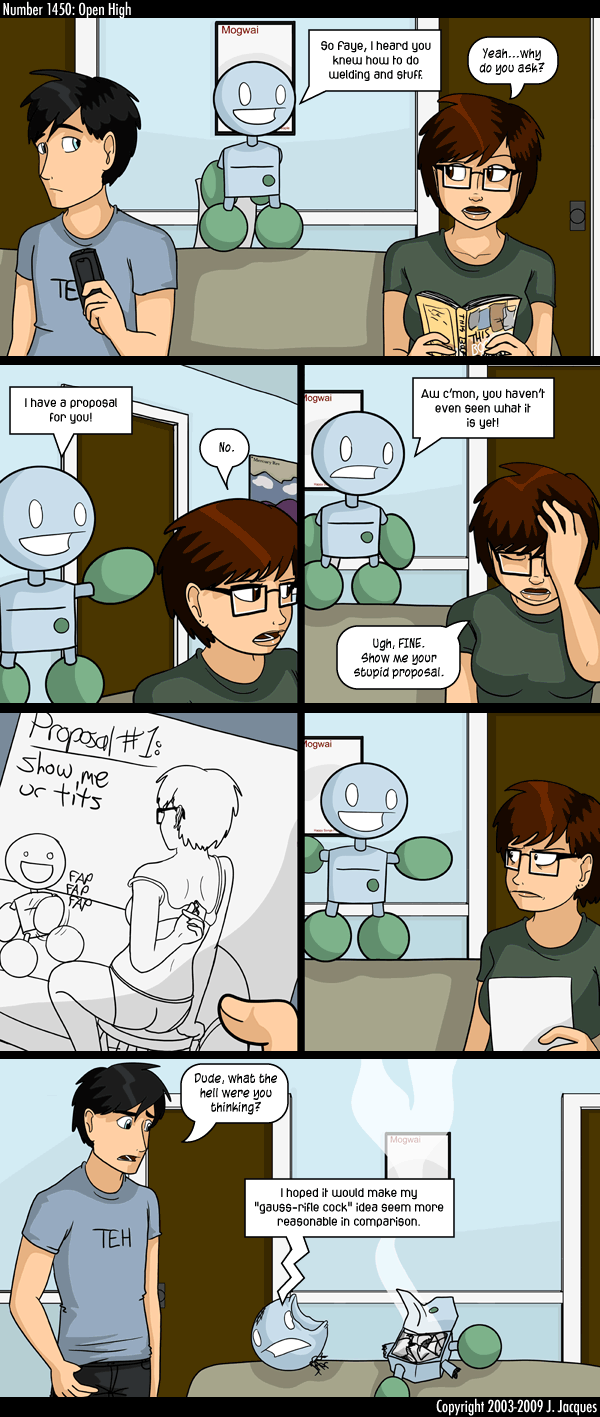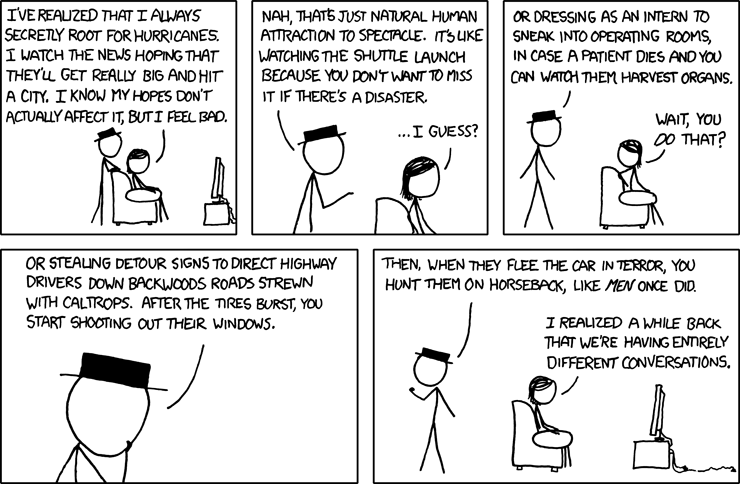[youtube=http://www.youtube.com/watch?v=Uoy8q3Xld9w]
Category Archives: Uncategorized
Shadows of new dimensions
If you haven’t read FLATLAND by Edwin Abbot, it’s worth a read, especially from a physics/philosophical (philosophysical?) perspective. This is the sort of thing that I love to have float through my headmeat when I’ve got time to ponder it. You start thinking about things like this that are just too big to hold onto, and soon enough you start feeling like you’re on the edge of some bigger truth, just past the horizon.
And when stuck in these moments, it makes me sad that there is no more Carl Sagan around, to put it into words that the rest of us can understand and appreciate:
[youtube=http://www.youtube.com/watch?v=Y9KT4M7kiSw]
Ye gods… I <3 Craig Ferguson
[youtube=http://www.youtube.com/watch?v=xFQkMAPVoIo]
Beautiful, beautiful! Magnificent desolation.
Why is it that we cling to horror (9/11: “Never Forget!”) but relinquish the victories? How many people understand the importance of 7/20? Sadly, I suspect, fewer every year. Mine is possibly the last generation to appreciate the magnitude of the technological leap humankind made between the Orville Brothers’ first flight and July 20, 1969. For thousands of years, mankind dreamed of flight; finally discovered, it took only seven plus decades to extend that dream to a rock where no man had ever walked before.
Never before.
And sadly, very few times afterward.
Take a few minutes out of your day and educate yourselves on one of the few things in my lifetime (I know, a few years early) that we as a species have gotten right and can celebrate without regret.
[youtube=http://www.youtube.com/watch?v=RMINSD7MmT4]
Wikipedia entry on Apollo 11, the first manned mission to land on the moon
Apollo 11 facts often get twisted out of shape in the retelling
After 40 years, get the back story behind that ‘one small step’
Bring on the Haha
Today’s goal for you — and I don’t refer to Friday, July 17, as today, but rather whatever day you are reading this; and by you, I mean you and everyone you can manipulate through licit or not means — is to find some laughter on the web, share some of what you find with others, and maybe — just maybe — recommend something to make me laugh.
For instance:
This is Questionable Content. Much like PVP below, and below that Something Positive, it can be best to start from the very first one and move your way forward. QC is sometimes hit and miss with me, but when it hits, it’s second only to…
If XKCD doesn’t make you laugh, then you really have no business reading anything I write, or listening to me. I can spend hours once a month rereading the entire batch of comics. His arc involving Nathan Fillion and Summer Glau from Firefly is quite possibly my favorite ever.
 Nerd alert!!! PVP is another one that you really should take from the beginning and move forward. There’s a lot of inside jokes and self-reference. (And amazingly, for me especially, PVP is mostly innocent fun — especially compared to what I’m about to share with you)
Nerd alert!!! PVP is another one that you really should take from the beginning and move forward. There’s a lot of inside jokes and self-reference. (And amazingly, for me especially, PVP is mostly innocent fun — especially compared to what I’m about to share with you)
Oh, wait. I lied. There’s actually a tie for first place:
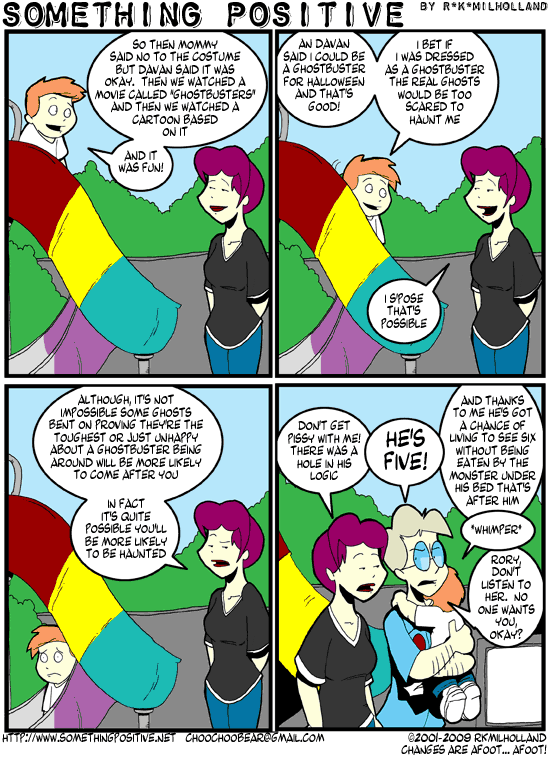 Something Positive is awesomefuckingtastic. Go to the beginning and don’t stop reading until you’ve read all the way up to current day, or until your eyeballs have exploded from the strain of staring at a screen for days without rest. It’s so good that I was going to pick a favorite, and going back only a month had found eight that are worth sharing. So I picked one at random.
Something Positive is awesomefuckingtastic. Go to the beginning and don’t stop reading until you’ve read all the way up to current day, or until your eyeballs have exploded from the strain of staring at a screen for days without rest. It’s so good that I was going to pick a favorite, and going back only a month had found eight that are worth sharing. So I picked one at random.
Fun fact: my iPod just started transitioned from the snarky wit of Weezer to the soul-devouring crush of Dimmu Borgir. And so I give you:
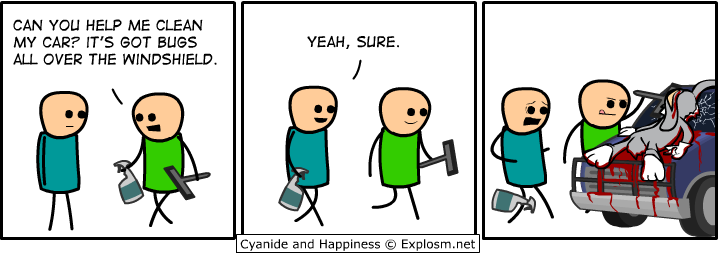
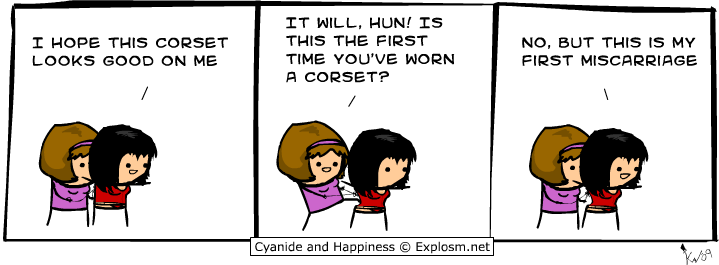 After you’ve finished reading through the Cyanide and Happiness archives, you’ll be speechless, affectless, and probably broken, the same way that abused teenage runaway girls never really recover and have normal sex lives, no matter how much their boyfriends do right for them and treat them like queens and buy them everything they’ve ever wanted. The weeks stretch on, and just when you think it’ll be okay to maybe try something a little new and exciting, you get blamed for wrecking years of therapy, and then her older brothers — who were also abused, you suspect — start threatening you, and you have to move to Alabama and assume a new identity.
After you’ve finished reading through the Cyanide and Happiness archives, you’ll be speechless, affectless, and probably broken, the same way that abused teenage runaway girls never really recover and have normal sex lives, no matter how much their boyfriends do right for them and treat them like queens and buy them everything they’ve ever wanted. The weeks stretch on, and just when you think it’ll be okay to maybe try something a little new and exciting, you get blamed for wrecking years of therapy, and then her older brothers — who were also abused, you suspect — start threatening you, and you have to move to Alabama and assume a new identity.
You’ll have to show the judge on the little dolly where C&H touched you, is what I’m getting at.
My $.02, and this is all
Michael Jackson apparently didn’t want to be cremated, per se. Instead, since he is mostly plastic, he will be melted down and made into Legos so little boys can play with him for a change.
If you’re not already a Pixar fan…
Then you’re a hopelessly broken person.
But maybe, just maybe, this will restore your faith in humanity:
THINGS I LIKE: Vonnegut’s TIMEQUAKE
There is no way a beautiful woman can live up to what she looks like for any appreciable length of time.
-Kurt Vonnegut
Timequake, it was said, would be Kurt Vonnegut’s last novel. As it turns out, he was, in fact, sadly correct. We all hoped that one day, Kurt would break his silence, get tired of not writing again, surprise us all with a broken promise. IT never happened.
For a lot of people, that’s really too bad — the book was not well-received. Which to me is too bad. Certainly, some of his books are better as whole pieces, at least more accessible. And Timequake really isn’t a novel, as much as a collection of ponderings, and documenting the process of writing the first iteration of Timequake, and bits and pieces of that novel, and musings on life.
It’s that experimental idea that makes the book so wonderful to read. Because it should be filled with a sense of disconnect, leaving you wanting a thread that runs through all, but it isn’t and doesn’t. Somehow it works.
The plot — such as it were — is simple, and brilliant in its simplicity: there is a timequake that rolls the years back a decade, from 2001 to 1991. And when time finally resets itself, and starts moving forward again, everything happens exactly as it once did for ten years. All the same actions and reactions, lives and deaths, triumphs and mistakes. This time, though, the person carries full awareness of what’s coming.
If you knew that you might one day have to relive these ten years of your life, would you be acting and reacting like you do? Knowing with all certainty that you’ll have to relive it again?
Timequake is filled with bits and pieces, perhaps a final clearing space for Vonnegut’s thoughts that never found a larger home over the years. I don’t know if he’d be really happy about having to relive any ten years of his life, but I know that being presented with that thought helped me shaped my own life going forward.
I try to reread it every six or eight months — both to remind myself of certain things, and because if I have to rewind and relive my life, at least I’ll know that every few months, I’ll be reading a good book again.
Many people need desperately to receive this message: “I feel and think much as you do, care about many of the things you care about, although most people don’t care about them. You are not alone.”
–KV
Return to abstract ramblings…
I wish this post could be appropriately titled, “Return to Charlotte Rampling.”
Welcome, once again, to the USS Insomniactive. Today, we’ll be heading down the stream of consciousness. Strap in and have a few shots. This could get hairy. Or really boring.
Depends on perspective.
Early, I thought this:
There is a vast chasm between seeking answers and seeking the answer you want to hear, and chasms impede progress.
And I’m surprised that I never thought it sooner, as it is as applicable to myself (even today, but especially years ago) as it is to anyone that may or may not have inspired the thought. If you seek out advice, the source of advice is important; not only for the quality of what you will get out of it, but also for knowing what to expect. Some people will treat a depressed person like a china doll, and tell them exactly what (they think) the depressed person wants to hear. Some people will tell them bluntly what (they think) they need to hear.
Is one any worse than the other? I still think that the chasm between the two impedes progress from the sad state to the content, or even happy, state. It’s not that you can’t cross a chasm, but it takes a lot more time and effort.
Keeping in mind, too, that advice comes from the mouths of humans, and us humans? We don’t know shit.
On a lot of levels, I’m guessing that there are no definitive answers, nothing quantifiable in a scientific manner. I argue that if there were, we’d know about “The Answer” by now.
Depression — like anger — is like a warm blanket you got from a British colonial soldier. It’s comfortable, and warm, and easy to justify hiding inside. And eventually, it will kill you, because that blanket is diseased, soaked in tuberculosis or syphillis or whatever the current rage is. The trick to beating depression is fighting it, not giving in to it.
Not to suggest that it’s easy, or so matter of fact. That’s why I chose the word “fighting.” In time, as you become more practiced and conditioned, fighting becomes easier, but the potential for pain is inherent.
You learn to live with it.
I’m not as sanctimonious as I seem, I think. Because I’ll tell you up front, the more I know, the more I realize that I know jackshit about fuck-all. Because I can pass on what I’ve learned from my experiences over 37 years, but I still have trouble remembering my own advice sometimes. And even remembering, I sometimes choose to ignore. I sometimes like the cold comfort of withdrawing into my own head and reminding myself of how much better it could be, of how much better it was, of how much the here and now sucks. That’s easy, like falling asleep in the snow instead of pushing on to salvation.
But somewhere in the back of my head, I always know. Even if I don’t know anything, in the end.
And I realize that there is no universal answer, because the answer — and the question that compels it — is ultimately derived not just from the question but also from all the life experiences that have shaped and affected the seeker from day zero. It’s contextual. If it wasn’t, then maybe seeing a psychologist would work for everyone, or taking Effexor, or listening to cinematic music and reading Vonnegut. But none of these works for everyone.
The best we can do is suggest what has worked for us, offering a path of exploration for the seeker, understanding that theirs might be a different path, and that there is no right or wrong in it.
Also: never try to quantify anyone’s emotions, especially in comparison with your own. It is impossible — impossible — to know how anyone feels. You have only your own point of reference for that, and that automatically colors your comparison. Yes, you and I are looking at the same sky, but we can never be sure that we perceive the colo blue the same way. Every situation affects us differently, you and I, and you can never say that I have it easier or harder, because you have no idea that I see things in the same colors and tones that you do.
At the same time, don’t hesitate to offer advice just because you’ve never gone through X situation. Maybe you’ve never been divorced, but you have broken up with someone, or felt heartbreak when your dog died. Maybe you’ve never lost your best friend or spouse, but you might have lost a parent or sibling.
On some level, it becomes a twisted version of method acting. You place yourself in what you imagine is a comparative place of emotional reaction, and you pass on what you’ve learned, what worked to get you through that moment. Maybe it helps, maybe it doesn’t, but you never know if you don’t try.
Most important of all, though, is reminding yourself day in and out that you can’t be responsible for anyone else’s actions or reactions or — especially — feelings. If you live to make someone else happy, ultimately, you will fail. And worse, what will you do when they leave or die? What will you live for then?
We come into this world alone. We go out alone, and we invariably spend a fair amount of time in between alone. And you know, that’s okay. It has to be.
You can’t fix anyone’s problems for them, and you shouldn’t allow others to expect that of you. All you can do is offer them a path, and hope that there is something from your pain and hard work and seeking that perhaps points them in the right direction for their own solutions.
I’m hungry. Someone get me some lunch.
Notes from a wedding
Random thoughts from this weekend:
- One of James’ groomsmen went to school from an early age with John Cena. Apparently, he’s a really nice guy.
- The B&A Warehouse has a grits bar available for parties and wedding receptions. If you ever invite me to something at B&A and don’t offer the grits bar, I will protest. Loudly. Hungrily, even.
- Rawlins (the bride) looked beautiful. I finally realized why I’ve had a crush on my little brother’s girlfriend for years and years — the uncanny resemblance to Tina Fey.
- I guess in a town this small, it’s no real surprise to eventually cross paths with a given group repeatedly, but there was a whole lot of Indian Springs in my weekend.
- Wade’s new girl is pretty hot. Apparently smart, and successful, too, but whatever.
- Interesting cross: my brother, me, and his friends, and the bride’s family’s friends. I kept hearing Billy’ Joel’s UPTOWN GIRL all weekend. It was weird.
- Having all three siblings and the parents in one place is way too rare, but maybe the more special when it happens.
Congratulations, James and Rawlins. You guys deserved every minute of it.

